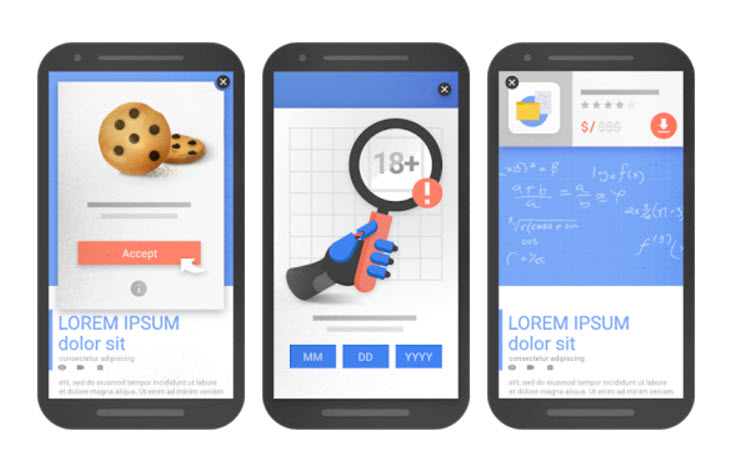Google’s new algorithms will punish you for your intrusive interstitial if you have a pop-up everywhere. If you’re wondering ‘what on earth does that mean?’, read on…
As of the 10th January 2017, Google will punish websites with mobile pop-up ads by ranking them lower in search results. This change aims to simplify mobile search results; and “help users quickly find the best answers to their questions, regardless of the device they’re using” (Google). It refers specifically to ‘intrusive’ pop-ups which make content less accessible to a user.
Google has outlined three specific examples of intrusive pop-ups which would affect the ranking of a website in search results:

- Pop-ups that cover the main content of a page: either immediately after the user clicks on the page, or whilst they are looking at it.
- Standalone advertising content which the user has to dismiss before they can access the page content.
- Ads which fill the screen and require the user to scroll down “below the fold” to view the content they are looking for.
It is SO important for your business that your website performs well in Google search results. Therefore, you need to get those pop-ups off your site as soon as possible! It’s no good having a beautiful, fully functional website that nobody can see because Google doesn’t like it.
However, Google has indicated a number of pop-up types which, used responsibly, will not affect your search result rankings. These are:

- Pop-ups determined by the law, such as for cookie usage or age verification.
- Login dialogs for websites which have content that is not publicly visible, such as content that is behind a paywall.
- Banners that take up a reasonable amount of the screen (and therefore do not prevent the user from seeing the content they were looking for) and that are easily dismissible. “Install App” banners by Safari Chrome are examples of these pop-ups which are ‘allowed’.
Google claims to have introduced these pop-up punishing algorithms because “pages that show intrusive interstitials provide a poorer experience to users than other pages where content is immediately accessible. This can be problematic on mobile devices where screens are often smaller.” However, some people believe that Google wants to give users less of a need to use ad blockers. This is because Google makes much of its money from ads.
Google has said that this is only one part of their ranking criteria, so your page may still rank well with good, relevant content. But we wouldn’t take any chances… STOP THAT POP-UP!!

